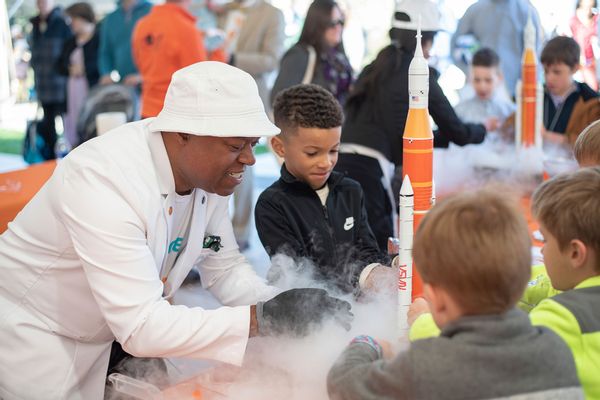
For Dr. Frederic Bertley, there’s a subtle connectedness among the seemingly disparate in the world. That connectedness underpins both his own understanding of the sciences, and his strategy as a communicator and educator of them. Affectionately known as “Dr. B,” Bertley is the President and CEO of the Center of Science and Industry (COSI) in Columbus, Ohio, now celebrating its 60th year as a brick-and-mortar museum in the heartland.
A Harvard-educated immunologist who spent his university days working on HIV and AIDS vaccines, recognition of Bertley's leadership in science education has extended to the White House and wider world. Amid a growing American distrust of science — fueled by partisan rhetoric around COVID-19 — Bertley’s approach to solving the science-trust problem is one of radical common sense, with a Renaissance spirit.
In an interview with Salon, Bertley talked about his and COSI’s roadmap toward making scientific understanding more accessible to diverse groups. Bertley’s methods include connecting the arts and humanities to science communications aimed at the general public, rebuilding classroom practices and leveraging the natural intelligence of every age to show people how much they already know about seemingly complex topics.

Let’s talk STEAM — science, technology, engineering, art and mathematics. While the term is usually seen in youth-education contexts, bringing the A into science communications seems to make science more accessible for savvy adults too. For instance, when culturally attuned media audiences come into contact with hard sciences, there’s often a disconnect that can be bridged with an arts-focused lens. How does the A in STEAM have an impact on science accessibility on your side?
First thing: communication. You've got to find a common vocabulary. So if you're a plasma physicist or an organic chemist, you're working on this weird small molecule that no one else understands. Great. That’s not going to work with the general public. Whether you have college degrees or PhDs in history — you’ve got to find a common vocabulary.
It's becoming in vogue now to move from STEM to STEAM. So you have a lot of people who are in that science-y kind of STEM space that just add the A because they want to get funded, or for other reasons. Then you’ve got the other side, people who are working harder to add the STE because they want to say they're connected. And some people do it well, don't get me wrong, but in general a lot of it's just kind of like "oh, polite nod to the other." And we don't approach it that way at COSI.
And why do we do science? Why do we have science and its cousin, engineering — and then make technology? 99.9% of time it's to ameliorate the human condition, right? Harnessing fire so we can cook food and live longer, coming up with medicines to save our loved ones, and these devices we have in our pockets — it’s the effort to move humanity forward, and bring us closer. Well, nothing does that more than the arts.
That's why you go look at a Gauguin, a Matisse, a Basquiat. That's why you want to understand fabrics and textures and colors, why you study history. For us, they are intimately connected. The best scientists have been completely creative, right? For us, STEAM is a real thing. That's how we navigate our universe. That's how we make it through every day.
On the topic of COVID-19, we can say it obviously won't be the last pandemic we have. And we’ve seen so many flaws exposed in how science is communicated in fast-paced journalism and media. But scientists and communicators now face an even greater deficit in public trust, heavily fueled by political disinformation campaigns among the anti-science crowd.
Science nihilism was a thing before the pandemic, existing at whatever percentage in whatever society you looked at. But the pandemic just took that science nihilism and added rocket fuel to it. And the reason why is that you had this weird time. We're coming out of Black Lives Matter movements, and other social movements are bubbling up. The pandemic shut the world down, things were tough, maybe you lost your job so you’re not feeling good, and things are getting politicized — it literally was a classic mash-up of just unbelievable things that all happened right at the same time.
So when you layer on politicization, then people are angry because they link it back to real life — and that's made that science denialism rise from anywhere from 5% to 15% of population to smack dab at 50%. For sure along partisan lines, and then even beyond that in other spaces.
But, in general, the medical and scientific community didn't step out front and say, “Hey, new bug — we don't have an understanding of it. We have no immunity for it. We are learning as we go. We are going to make mistakes. We are not going to be sure, but we promise you science is a process of accumulating data and getting closer to the truth.” We didn't do that.
Can you talk to us about the path forward for creating more clear, helpful science communications — and for engaging the public, and even students, in a way that reestablishes trust?
Education is critical, but it's got to be education with a consistent drumbeat … So how do we have a consistent drumbeat around science and STEAM literacy? And then the final point is, which is we've got to teach it better. We've got to connect it to things that people can relate to.
So how do we teach all the complexities of our beautiful natural universe? In ways that can connect people to vocabulary they understand — to things that are meaningful to them, and that will help them feel much more comfortable about science, and therefore less afraid of those big black boxes of scientific data.







